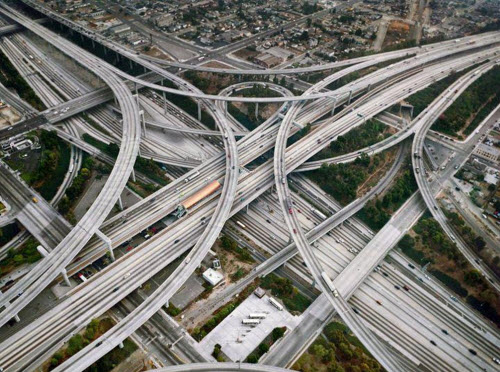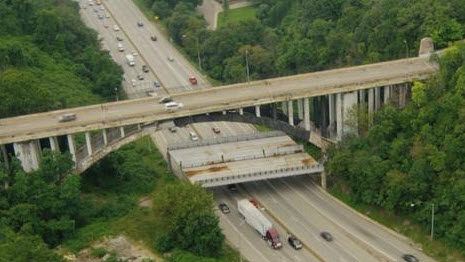Congress Can’t Even Fix the Gas Tax
"America’s one big pothole”, says Ray LaHood, former transportation secretary Dec 6 2014
There is probably no more uncomplicated example of how useless Congress has become than its failure to raise the federal excise tax on gasoline and diesel fuel. The tax pays for the upkeep of the roads we drive on and bridges we cross. Both have fallen into disrepair for lack of money. The tax, at 18.4 cents per gallon of gasoline and 24.4 cents for diesel, was last raised in 1993. Inflation since has reduced the buying power of the gas tax to about 11 cents a gallon. On top of that we drive less. So we buy less fuel and
pay less tax. The expanded population as a whole even drives less total miles than the peak in 2007. Shrinking the tax revenue even further, we drive more fuel-efficient internal combustion cars. And some are now gas-sipping electric hybrids.
All those factors combine to cause the Highway Trust Fund perpetually to teeter on the edge of insolvency. And yet Congress sits idle.
The American Society of Civil Engineers gives the nation’s infrastructure an overall grade of "D".
Other nations spend half again more on infrastructure than the U.S. as a percentage of their gross domestic product; they can afford to because the U.S. instead spends its hundreds of billions on our military, enabling allied nations to spend less..
There are 600,000 bridges in the country and one in nine — some 70,000 — is considered to be "structurally deficient", its crumbling concrete and corroded steel in evidence. Of those, 18,000 follow a design called "fracture-critical", where the collapse of just one of its structural elements can cause the entire bridge to fall. In August 2007 the 40-year-old Minneapolis I-35W span failed, killing 13 people and injuring 145 others. In August of this year a tractor-trailer nicked an overhead girder on the I-5 bridge near Seattle and sent two cars plunging into the river below.
 The structure underneath is to catch falling concrete from the crumbling Pittsburgh bridge.
The structure underneath is to catch falling concrete from the crumbling Pittsburgh bridge.A "60 Minutes" segment showed a Pittsburgh bridge where a structure was built underneath it to catch falling concrete. Lack of money limits inspections so that fewer problems are foreseen to enable advance planning. The result is that when a structural weakness is spotted, traffic has to be halted instantly with potentially months of disruption for commuters.
Ed Rendell, the former governor of Pennsylvania, says, “the infrastructure part of the stimulus worked very, very well" in his state. "We went from 6600 structurally deficient bridges to 4500. But think of that. That’s huge progress. But we still have 4500 bridges, any one of which can collapse”. None of his experience has swayed Republicans, none of whom voted for the stimulus and reflexively speak of it as "failed".
Keeping their jobs is the paramount criterion for the members of Congress, fearful of voters who say they want an improved transportation infrastructure — 66% said in a 2012 poll that it is either extremely important (27%) or very important (39%) — but who don't want to pay for it. No gas tax increase said 71%, no new tolls said 64% and 58% said no to replacing the gas tax with a mileage tax.
To hear the president and congressional politicians talk, infrastructure is one of the few goals that has the support of both parties, but only if it doesn't cost anything. Republicans are unwilling to vote the money without spending cuts elsewhere that Democrats object to. A tax overhaul put forth by now-retiring House Ways and Means Committee Chairman Dave Camp that included money for infrastructure disappeared as soon as introduced.
And yet, elements in Congress are at this moment trying to pass a $450 billion package of special interest tax breaks for business that the Wall Street Journal tells us includes perks for "Hollywood films, wind turbines, Nascar owners and race horses".
President Obama regularly champions infrastructure restoration when he speaks around the country. A response by House Speaker John Boehner last year was, “It’s easy to go out there and be Santa Claus and talk about all these things you want to give away, but at some point, somebody’s got to pay the bill”. On another occasion he said, “Trying to find a funding source to repair the nation’s infrastructure is still a big goal of mine", who speaks of the money as if it had been misplaced. "The hunt has been underway for the last year and a half to find that funding source. I wish I could report to you that we've found it, but we haven't". Yet in plain sight is the simple, though partial, remedy of the gas tax which seems to be unmentionable.
"Our infrastructure is on life support" said Ray LaHood, former transportation secretary, on the "60 Minutes" broadcast, the consequence of political paralysis in Washington.
Most states are no different. They have lacked the political fortitude to raise their road taxes, too. As a counter-measure, states like Texas are converting selected highways to toll roads. European nations have long imposed heavy taxes on gasoline — $5 a gallon in Denmark! — yet our spineless politicians are fearful of raising the gas tax to 30.7 cents a gallon, which equals the 18.4 cents of 1993 adjusted for inflation. What better time for Congress to feign a little courage with gasoline nationally averaging $2.74 a gallon at this writing.
Of course, boosting the gas tax will not be nearly enough to pay for decades of neglect. To do that the American Society of Civil Engineers estimates that we need to spend $3.6 trillion in the next 8 years.
Republicans along with some Democrats are focused on the Keystone pipeline to please their oil industry sponsors, but when talking to the public they stress that the "the employment figures associated with Keystone are stunning". That was Mitch McConnell speaking the day after the election. The party line is that it will provide over 40,000 "union" jobs. (Funny how the number keeps rising. The State Department had said 6,000 in 2011 vs. the pipeline company claim of 20,000.) But one thing's certain: if jobs really were a major objective, a concerted plan to restore America's infrastructure would create hundreds of thousands of well-paying jobs.
Our obsession with free-market capitalism dictates that everything must make money or die. How well is that working? It is time we re-orient our thinking and ask what kind of nation we want to have. If we agree that in this new century we do not want to live with the crumbling infrastructure of the last century, if we decide as a people that we do want safe bridges, well-maintained roads, modern airports, hi-speed rail and so forth, then we should set about it as a national plan, tally the cost, and only then uncompromisingly figure out how to raise the money to pay for it. And that would mean more than a the gas tax. Maybe we should spend less money at Black Friday doorbusters and more on a better country.
Please subscribe if you haven't, or post a comment below about this article, or
click here to go to our front page.

